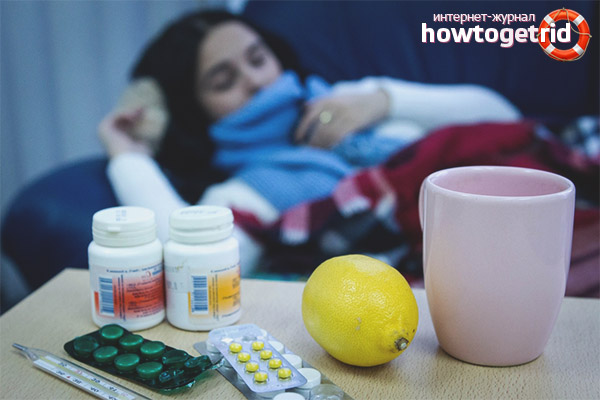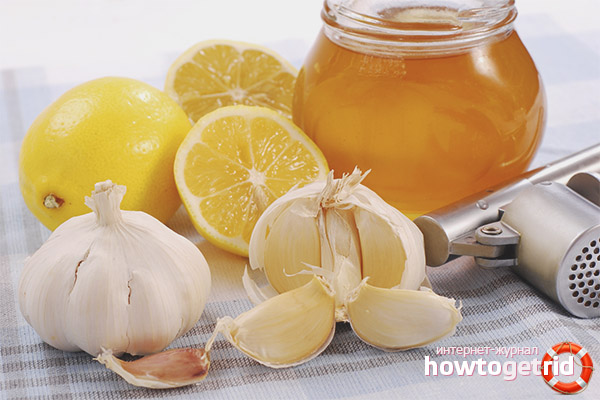The content of the article
Influenza is a serious illness, often accompanied by complications that affect the heart and lungs. In addition, exacerbation of existing chronic diseases may occur. To prevent this, it is important to identify the disease in a timely manner and to begin appropriate treatment as quickly as possible.
Symptoms
Distinguish flu from other diseases will help characteristic clinical manifestations, which include the following:
- Abrupt onset of the disease. From the first days there has been a significant increase in body temperature.
- Weakness and general malaise are observed.
- The patient aches in joints and muscles.
- Appetite worsens.
- Chills.
- Photophobia appears.
In difficult situations - the patient may bleed from the nose, and may faint.
How to cure the flu at home
If it was not possible to protect yourself from the disease, it is necessary to consult a doctor as soon as possible so that he prescribes the appropriate treatment.
There are several specific narrowly targeted drugs that destroy the flu virus. These drugs have low effectiveness in the treatment of other respiratory infections, as well as conventional antiviral drugs (Tera-flu, Anaferon, etc.) can not cope with the flu. The following drugs have high effectiveness against this disease:
- Tamiflu. The main active ingredient is oseltamivir. The drug is prescribed to patients of adult and childhood (from 1 year). Pregnant and lactating women are allowed to use, but prior consultation with a doctor will be required. The maximum effectiveness of the drug is observed if you take it at an early stage of the development of the disease (no later than the second day after the onset of symptoms).
- Relenza. The active substance is zanamivir. The medicine is prescribed for adults and babies from 5 years. Effective against influenza A and B viruses. Intended for treatment with inhalation.
In addition to the above drugs, the patient can be prescribed more affordable drugs that have antiviral properties and have proven effective both in the case of influenza and other viral infections:
- Arbidol Prevents the entry of type A and B viruses into the cells of the body, provides long-term protection, reduces the clinical manifestations of intoxication, accelerates the healing process, and prevents the occurrence of complications. The course of therapy is 5 days.
- Anaferon. It is a homeopathic remedy that has antiviral and immunomodulating properties. If the first symptoms of an acute infectious disease or flu occur, take it according to the scheme: the first four doses, one tablet every 30 minutes. Then, during the first day - three more tablets with equal intervals between doses, the second day and subsequent ones - one tablet three times a day until the symptoms are completely eliminated.
- Amixin. The main component is tilorone - a substance that is highly effective not only against influenza, but also herpes viruses, cytomegalovirus, hepatitis. You can not take pregnant and lactating women, as well as children under 7 years.
In addition, symptomatic treatment is performed. Medications like Ibuprofen and Paracetamol can help relieve headaches.
Nasal congestion will help eliminate drops or sprays from a cold - Tizin, Naftizin, Sanorin.To sputum faster, drugs with a mucolytic effect are prescribed - Lazolvan, Ambrobene, ACC, Mucosol. To rinse the throat, use furatsilin or herbal preparations, which include sage, chamomile, calendula.
You can treat the disease of mild to moderate severity at home. It is necessary to regularly air the room, change bedding. The patient should use a personal towel and utensils. In the acute stage, it is especially important to drink more - tea with honey and raspberries, fruit drinks from sour berries. The restoration of normal activity after influenza should be carried out gradually.
Folk remedies
Traditional medicine recipes are often used in the fight against flu and colds. It should be noted that many of them are quite effective. But it is not necessary to consider that home remedies will have a less antiviral effect than special medicines. Although many doctors believe that the virus of this disease is very active and aggressive, therefore, it is not always possible for folk remedies to cope with it. For this reason, it is recommended only to supplement them with the main drug therapy prescribed by the doctor.
Means prepared according to the recipes of traditional medicine are used to restore the patient's immunity, supply his weakened body with useful substances, which will speed up the healing process.
You can use one of the following recipes:
- Beat the yolks of a chicken egg (4 pcs.) Until a foam appears, adding a little sugar. Then warm 500 ml of beer, add to the mixture, pour cinnamon on the tip of a knife, cloves (3 pcs.), Mix and put on medium heat. After 5-10 minutes (not bringing to a boil), remove from the stove, cool. Consume 250 ml of medicinal product at a time. Repeat three times a day.
- To combat the nasal congestion that accompanies the flu, you can use the following remedy: mix a small spoonful of honey and a small amount of beet juice. The resulting fluid to drip nose up to five times a day.
- Rinse one middle head of the onion without removing the husk. Pour water so that it covers the bulb. Pour 50 grams of granulated sugar, put on low heat. After half an hour, remove from the stove, allow to cool, strain. Drink a decoction in a tablespoon five times a day for half an hour before eating.
In addition, inhalation is recommended. To do this, use the peel of the potatoes, eucalyptus essential oil or sage.
Intensive sweating will help speed up the healing process. Honey, lemon and other citruses, garlic and onions, jam of their currants and raspberries, chicken broth will help to provoke it.
Daily routine and nutrition
A person with a flu illness is given a disability certificate for 1-1.5 weeks. Usually during this time comes recovery and recovery. A feature of influenza is that it leads to a significant decrease in the body's defenses. This means that even when it was possible to get rid of the virus, the body has not yet managed to get so strong as to lead a habitual active lifestyle. If you do not preserve it, the likelihood that a secondary infection will join will increase, and this will lead to the development of serious complications. In addition, the patient runs the risk of experiencing similar complications if, during the first days of the disease, he did not take the prescribed medications, did not comply with the bed rest and other recommendations of the doctor.
To prevent the development of complications that do not affect the nervous system, heart and blood vessels, you should have more time to relax, not to allow mental and physical stress. In addition, during illness, you should adjust your diet.The diet should not contain fatty varieties of fish and meat, fast food, sausages, canned food, coffee, alcoholic beverages, fatty and fried foods, sweets (except honey).
During the period of the disease and recovery after it, you should save your own body. It is recommended to take vitamin complexes and eat foods that include vitamins and minerals.
Possible complications
In some cases, it happens that, despite the therapy, there is not a decrease, but rather, the progression of the clinical manifestations of influenza. A complication that can occur against the background of this disease is influenza viral pneumonia. It can be encountered by people who have no health problems, as well as those who have chronic pathologies of the heart or lungs.
It happens that after a visible elimination of the symptoms of the disease a few days later, the condition worsens and bacterial pneumonia develops, accompanied by a strong cough and the appearance of sputum with pus. A provoking factor in this process is microbes that inhabit the pharynx, which are activated against a background of weakened immunity. In this case, the treatment will be carried out using antibacterial drugs.
Viral and bacterial pneumonia in most cases affects people who suffer from pulmonary diseases, as well as chronic problems with the heart and blood vessels.
When is hospitalization necessary?
The risk group for complications after influenza includes children, expectant mothers, elderly patients and those with chronic illnesses. Such patients require careful medical attention. If he, having examined, advises hospitalization, it is advisable to agree.
You should know that in addition to pneumonia, other complications may occur:
- rhinitis;
- otitis;
- sinusitis;
- encephalitis;
- meningitis;
- CNS lesions.
Similar diseases against the background of the transmitted flu pose a serious danger, especially for the listed categories of patients at risk.
The doctor may prescribe treatment in a hospital setting for a patient whose fever does not drop for more than two days, even with the use of drugs. In this case, self-medication is highly not recommended. You should listen to the opinion of the doctor and follow all his instructions.
Prevention
Any disease is easier to prevent than to treat for a long time.
- As a preventive measure against influenza, you can use a gauze dressing while in public places during outbreaks of the disease, and if necessary, contact with an infected person.
- You should enrich your diet with products that include a large amount of vitamin C: sauerkraut, kiwi, citrus fruits, cranberries.
- It is good to eat a couple of cloves of garlic every day. This will help destroy bacteria in the oral cavity. Onions have similar properties.
- An important point in the prevention of influenza is personal hygiene. When washing hands, use an antibacterial agent.
Video: the best folk remedies for flu and colds











Submit